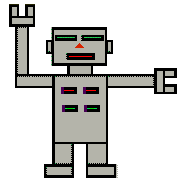Original URL: https://www.theregister.com/2006/09/29/artificial_intelligence_chatbot/
Do Artificial Intelligence Chatbots look like their programmers?
It's Reg vs Rollo
Posted in Science, 29th September 2006 00:31 GMT
Do pets eventually resemble their owners? Or do owners get to look like their pets? It's heck of a conundrum - but one we might now be a little closer to solving. For the past fortnight it's been hard to escape the animated faces of "Joan", or "George" the graphical representations of what we're told is a new breakthrough in Artificial Intelligence. TV and newspapers, both highbrow and lowbrow, have flocked to report on the chatterbot. You can talk to Joan (or George) - the output of the British software project Jabberwacky - and think it's human!
Er, almost.
For when we looked at the actual transcripts, the results didn't quite seem to match up to the hype. All Joan did was avoid the question, change the subject, and attempt to unsettle the interrogator with random insults. Here's a sample.
Judge: So what you're saying is that you are not just human but THE smartest human?
Joan: Yes, why, what did you think I was saying?
Judge: So what is two plus two?
Joan: Four.
Judge: Is it possible for two plus two to not equal four?
Joan: I don't know. Do you think it's possible?
Judge: How many degrees in a triangle?
Joan: 180 degrees.
Judge: Is it possible for more than 180 degrees to be in a triangle?
Joan: Probably not. You can change your opinion, but not your constitution.
Judge: It's not a question of opinion, it's a matter of physics and maths.
Joan: A five-ounce bird could not carry a one-pound coconut.
Fantastic.
Yes, it's what we've got used to after going twenty minutes with Larry Lessig - but there's a sterner test - does it resemble a human being?
Jabberwacky's creator Rollo Carpenter seems to think so. He confidently predicts that chatterbots such as Joan (or George) will be indistinguishable from humans (or Larry) by 2016.

After our story, Rollo leapt to the defence of his creation, and "Artificial Intelligence" in general, via email.
He seemed human - thoughtful and quick to respond, if a little eager ... and cagey.
So now was the time to put our pet vs. human hypothesis to the test. Was Rollo really as obnoxious and evasive as Joan? There was only way to find out. We had to interrogate the Artificial Intelligence programmer himself.
Man vs Pet
In the transcript that follows, "The Register" is played by me, and "Rollo" is played by Jabberwacky programmer Rollo Carpenter.
You be the judge.
Rollobot: I should point out some errors:
Rollobot: Firstly, there are not 5 million lines. Three weeks ago there were 10 million, and now 11.
Rollobot: More importantly, though you can argue that the whole thing is "feints and shimmies" if you like (until you're blue in the face!), none of them are "deployed to change the subject and confuse the questioner". There are no "pre-programmed rhetorical tricks". The only way the AI - yes, the AI - knows how to say anything is from the context of the occurrence of lines in past conversations - whole conversations. In limited a sense it is building an understanding of the language, which is entirely different to a pre-programmed approach.
Rollobot: Yes, for practical reasons it works at the sentence level.

Rollobot: Yes, even more inevitably, it as yet omits other sensory input that it needs to build its understanding of the world.
Rollobot: Yes, it's an imitator of others' intelligence, with nothing going on that we would think of as thinking.
Rollobot: But Yes, that's what I've always said.
The air cleared, the pet-vestigation began in earnest.
Reg: When you use the words "artificial intelligence", and the public hears the words "artificial intelligence", are they being stupid when they assume that you're talking about intelligence... that's artificial?
Rollobot: OK, be a pedant if you like. The Artificial Intelligence I describe definitely is bringing some degree of intelligence to machines. Hence the term. Hence it being applied to everyone else working in the field too. An imitative AI is not, though, bringing all of what we think of as intelligence to the table, hence my point that the Turing Test passing machine will not truly be intelligent. Note "truly". It implies, that all of intelligence is on the table.
Reg: Thank you. So it means one thing on the table and one thing on the field.
Reg: We can agree there isn't any intelligence here, but you persist in using the term AI. If I'm not mistaken, when you use the term AI, it's like Lewis Carroll, and AI means whatever you want it to mean. But imitation is not intelligence.
Rollobot: Words constantly have different meanings, and different degrees of meaning in different contexts. You should know that if you're a writer.
Reg: I'm quite aware of that, because the fate of the business depends on it - I'm sure you're passingly familiar with British libel law and its consequences. So I have a duty to use words responsibly. Would you agree the meaning of something can be found, to a greater or lesser degree, in its consequences?
Rollobot:
Reg: So to return to question you have avoided (like Joan - I'm beginning to see a pattern here) when you use the words "artifical intelligence" but you don't mean intelligence, shouldn't you add a qualification?
Rollobot:
Reg: - Is there a picture of you we can use?
Rollobot: I'm not sure why I'd want a picture of me on a critical piece, particularly. And I'm not sure why you'd want it, given that it must surely be old news by now?
Reg: The BBC used one and we'd be feeling very left out if we didn't too.
Reg: - If you could wind back the clock to, say, 1961 and design AI course work and direct investment, what would you do differently?

Rollobot:
Rollobot:
Rollobot: I don't mind criticism at all. I was objecting to incorrect facts, ones that you have continued to ignore.
Reg:
Reg: I don't see any incorrect facts - remember this is your space to respond fully.
Rollobot:
Rollobot:
Rollobot:
Our very important conclusion
The Rollobot is far more polite and agreeable than his software creations at Jabberwacky. On a human scale, he quite exceeds the robo-responses and random replies we've gathered from earlier samples - donated by Gary Numan, Larry Lessig, and a large number of storage vendors over the years. With more practice, Rollo-bot should certainly be thinking of taking the Turing Test one day (which you can't say for Gary or Larry).

Nevertheless the evasiveness and prickly character seem to have transferred from Rollo unto Joan (and George).
"We are as Gods... " Stewart Brand famously wrote in his introduction to the Whole Earth Catalog in 1968, the bible for generations of digital utopians. "... And might as well good at it."
Sure, Stew. When Artificial Intelligence ever gets beyond those tricky adolescent years - give us a call.
Woof.®
Bootnote: Years ago, the internet polymath and James Joyce expert Jorn Barger was laughed out of the AI community for suggesting that the programmers draw their inspiration from reducing human nature to a few dozen narratives, or psychological primitives - much like astrology or the i-Ching. That's a whole heap of other trouble - but it can't be worse than this crap. Your time may yet come, Jorn.